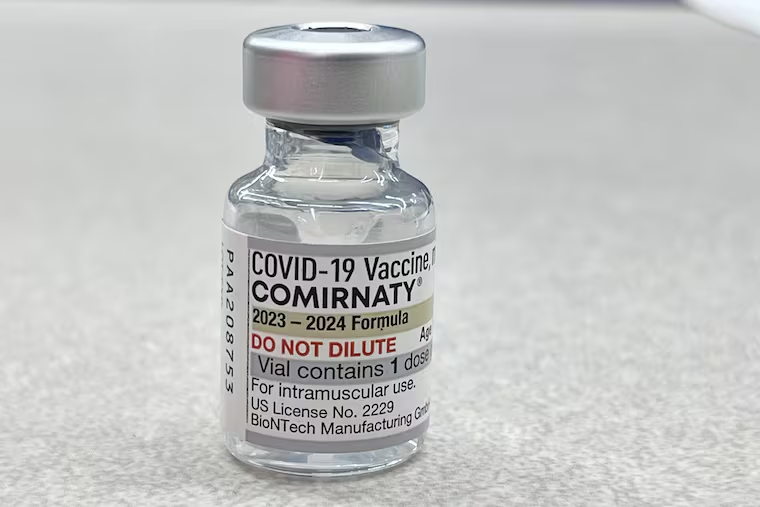Philly health officials encourage residents to get vaccinated and urge patience with a rocky rollout of COVID-19 boosters
COVID-19 hospitalizations have been rising in the city. There were 85 people hospitalized with the virus as of Thursday.

Philadelphia health officials are urging residents to get vaccinated against common respiratory illnesses this fall, after last year’s “tripledemic” of flu, COVID-19, and respiratory syntactical virus swamped emergency rooms in the region.
At a news conference Thursday, Health Commissioner Cheryl Bettigole acknowledged that some Philadelphians have struggled to get the recently released, updated COVID-19 vaccines because of shipping delays and insurance coverage issues.
Bettigole advised people who have had difficulty getting their shots to wait one to two weeks before trying again. She stressed that most insurers should cover the vaccine, and that people who are told to pay for the vaccine out of pocket ― in some cases costing up to $190 ― should call their insurance companies. People without insurance can get the vaccine for free through city programs for uninsured residents.
“This is going to get better; it’s going to get worked out,” she said. “I don’t want people to get frustrated with the insurance glitches and the appointment glitches.”
Since the federal public health emergency over COVID ended in May, the city health department is no longer handling the distribution of COVID-19 vaccines, which are now largely being distributed through pharmacies and covered by commercial insurance.
Despite the rollout challenges, the city does want to get as many people vaccinated as soon possible for COVID-19 and two other seasonal challenges: respiratory syntactical virus, or RSV, and the flu.
Philly heads into sick season with rising COVID cases, new tools for addressing RSV
COVID-19 hospitalizations have been rising in the city — there were 85 people hospitalized with the virus as of Thursday, after the city spent most of the summer with hospitalizations well under 50. But the city is not facing a massive wave of COVID infections, Bettigole said.
Last year’s tripledemic occurred when RSV and the flu, combined with COVID, fueled a rise in hospitalizations for respiratory illnesses, especially at children’s hospitals. RSV can be particularly serious for young children and older adults.
This year, health officials said, they’re encouraged by the development of new options to prevent the spread of RSV.
“We’ve never had preventative medicine [for RSV] for anybody,” said Lori Handy, a pediatric infectious disease physician at Children’s Hospital of Philadelphia and the associate director of the hospital’s Vaccine Education Center.
RSV vaccines have recently been approved for adults over 60 and pregnant people between 32 and 36 weeks pregnant. Vaccinating pregnant people will help to protect newborns against RSV, Handy said, and can reduce babies’ risk of hospitalization by 57% in their first six months.
Parents can also opt to get monoclonal antibodies for their newborns, Handy said. Monoclonal antibodies are lab-made proteins that act like natural antibodies to prevent disease, according to the Centers for Disease Control and Prevention. They are not vaccines that trigger the body’s own immune response, or a treatment for an active RSV infection.
Handy recommended the monoclonal antibodies for all infants under eight months. Parents with children between eight and 19 months who are at risk for serious complications from RSV should also consider getting their kids immunized, she said.
Paying for vaccinations post pandemic
Like the latest COVID-19 vaccines, some insurance companies are still figuring out how to cover the new RSV treatments. But interest at CHOP’s pediatric practices has been high, Handy said, and the health system is working to help parents navigate insurance issues.
The city’s health centers also provide childhood vaccinations for free, said Victor Igbokidi, who oversees the centers’ pediatric care.
Health officials said they’re aware that, more than three years into the COVID-19 pandemic, some people may be weary of more rounds of COVID vaccines, or skeptical of newer treatments like the recently approved RSV shots.
Those patients shouldn’t be afraid to speak to a doctor about their questions and concerns before the height of the coming cold-weather infection season, said Julia DeJoseph, senior vice president and chief medical officer at Delaware Valley Community Health, a nonprofit affordable healthcare organization, who also spoke at Thursday’s press conference.
”You don’t want to wait to be able to make informed decisions about vaccines,” she said.